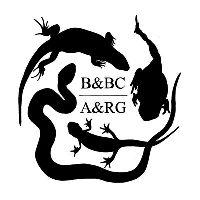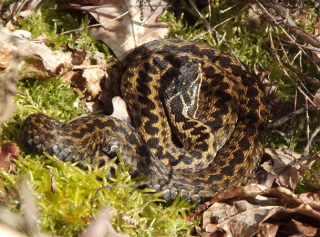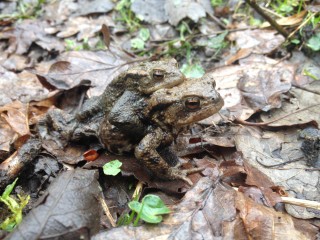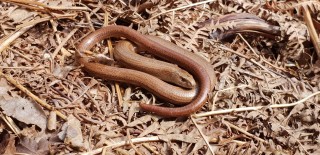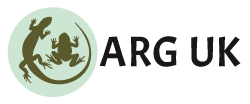About us
About Us
Hi there!
Welcome to the Birmingham and Black Country Amphibian and Reptile Group page, we are a volunteer-led group actively involved in the conservation of native species of amphibian and reptile and their habitats.
We aim to establish and monitor the distribution and status of amphibians and reptiles in the area; conserve reptiles, amphibians and their habitats through surveys and practical work; foster public interest in amphibians and reptiles and their conservation; and develop the skills of those interested in these species.
We are always happy to hear from people in the area about anything to do with reptiles and amphibians, if you are interested in finding out more or getting involved - please get in touch.
Reptile and Amphibian Sightings:
If you have been lucky enough to spot some of our reptiles and amphibians, please report a sighting on our 'Record A Sighting' page.
2024/25 Committee:
Chairperson - Amber Hopgood
Secretary - Katy Perry
Treasurer - Matt Armes
Records Officer - Amber Hopgood and Shaun Pope
Birmingham Project Officer - Matt Armes
Black Country Project Officer - Chris Dunn
Training & Events Officer - Amber Hopgood
Website & Social Media Officer - Amber Hopgood
Re-Elected Committee Members - Charlene Jones, Elsbeth Leighton, and Shaun Pope
Newly Elected Committee Members - Beth Bucknall
News
News
2024/25 Committee
We held our 2024 AGM on the 27th March and welcomed members to hear about what the group has been doing and to elect its 2024/25 committee. Minutes have been emailed to all members, and the election results were as follows:
|
Role |
2023/24 Position |
2024/25 Position |
|
Chairperson |
Amber Hopgood |
Amber Hopgood |
|
Secretary |
Katy Perry |
Katy Perry |
|
Treasurer |
Matt Armes |
Matt Armes |
|
Records Officer |
Amber Hopgood |
Amber Hopgood and Shaun Pope |
|
Birmingham Project Officer |
Matt Armes |
Matt Armes |
|
Black Country Project Officer |
Chris Dunn |
Chris Dunn |
|
Training and Events Officer |
Amber Hopgood |
Amber Hopgood |
|
Website and Social Media Officer |
Amber Hopgood |
Amber Hopgood |
|
Committee Members |
Annie Gwilt, Bekie Perry, Charlene Jones, Elsbeth Leighton, Remy St John-Reid, Richard Giedrojc, and Shaun Pope |
Beth Bucknall, Charlene Jones, Elsbeth Leighton, and Shaun Pope |
2023/24 Committee
We held our 2023 AGM on Tuesday 7th March and welcomed 15 members to hear about what the group has been doing and to elect its 2023/24 committee. Minutes have been emailed to all members, and the election results were as follows:
|
Role |
2022/23 Position |
2023/24 Position |
|
Chairperson |
Amber Hopgood |
Amber Hopgood |
|
Secretary |
Katy Perry |
Katy Perry |
|
Treasurer |
Matt Armes |
Matt Armes |
|
Records Officer |
Amber Hopgood |
Amber Hopgood and Shaun Pope |
|
Birmingham Project Officer |
Matt Armes |
Matt Armes |
|
Black Country Project Officer |
Chris Dunn |
Chris Dunn |
|
Training and Events Officer |
Amber Hopgood |
Amber Hopgood |
|
Website and Social Media Officer |
Amber Hopgood |
Amber Hopgood |
|
Committee Members |
Bekie Perry, Charlene Jones, and Shaun Pope |
Annie Gwilt, Bekie Perry, Charlene Jones, Elsbeth Leighton, Remy St John-Reid, Richard Giedrojc, and Shaun Pope |
Welcoming Our New Committee
On the 24th March we had our 2021 virtual AGM, and we are very pleased to announce that we have elected our 2021/22 committee and have welcomed a new committee member to the group, bringing our committee to a total of 9 people.
|
Role |
2020/21 |
2021/22 |
|
Chairperson |
Amber Hopgood |
Amber Hopgood |
|
Secretary |
Katy Perry |
Katy Perry |
|
Treasurer |
Hannah Lewis |
Matt Armes |
|
Records Officer |
Charlene Jones |
Natalie Norton |
|
Birmingham Project Officer |
Charlene Jones |
Matt Armes |
|
Black Country Project Officer |
Chris Dunn |
Chris Dunn |
|
Training and Events |
Paul Wilkinson |
Paul Wilkinson |
|
Website and Social Media |
Amber Hopgood |
Amber Hopgood |
|
Ordinary Committee Member |
Shaun Pope |
Shaun Pope |
|
Ordinary Committee Member |
N/A |
Dean Cordelle |
|
Ordinary Committee Member |
N/A |
Charlene Jones |
Newsletter
Hello everyone,
On behalf of the BBCARG, I hope that you are all well and getting on okay after this year; it has been a strange one for the group - and probably for many of the groups you interact with – as we have not been able to get out and about doing surveying, habitat management or running and attending events. That said, we are hopeful that next year we will be able to do more and already have a few things in the pipeline to work on and invite you to.
This spring, we did not send out requests for membership renewal as we expected that we would not be able to run events as usual. Something we have been working on since then is our very own ARGWEB platform, which will allow us to manage our members and help you manage your membership with us via a log-in portal. Once we have this set-up and working we will be emailing everyone and posting on here with more information, and if you would like to renew or start a membership with us you will be able to do so then.
Member or not, I hope you enjoy our newsletter put together by the committee. Please note that from next year, only our paying members will be receiving our newsletters and will have better access to events, training and updates from us - so if you would like to stay in the loop make sure to join again when we send out the details. Stay safe, and we hope to see you soon.
View our November 2020 Newsletter here.
Frog or Toad?
This time of year everyone gets quite excited about the near arrival of our beloved frogs and toads as they move to ponds and start breeding. Many toad patrols are active and well, helping common toads move safely to their breeding ponds.
If you have ponds and wetlands near you, or some amphibians have taken up refuge somewhere nearby - it is very useful to be able to understand what it is that you've found so that you can then report your findings to us! The more information we have about our frogs and toads, the better we can act to protect and preserve them.
As a result, we've put together some guidance to help you figure out whether you have fabulous frogs or tremendous toads in your local area. The two species are quite distinct when you know what you're looking for, so hopefully this will help.
So what are frogs and toads?
- Find out about common toads (Bufo bufo) - information page and video. Find out what they sound like here.
- Find out about common frogs (Rana temporaria) - information page and video. Find out what they sound like here.
- What do frogs and toads look like? ID Guide.
- But what about in real life? Photos of frogs and toads.
- What about spawn? Spawn FAQs can be found here.
If you do find frogs, toads or spawn near you - make sure you report it via the RecordPool portal on our website - find it under the 'Record A Sighting' tab.
Note - We 100% encourage people to get out an about looking for our wonderful amphibians, but care is needed. Make sure you're aware of how to keep them safe from harm, make sure you're up to date on amphibian disease. We do not recommend that anyone handle any animals unless it is absolutely necessary.
Events
Events
Past Events
Show Upcoming EventsAn Evening Of Herpetology
Thu 14th February, 2019
Join us for a series of short herpetology talks followed by our Annual General Meeting, see the flyer below for more details.
The talks are as follows:
Ben Wood - Warwickshire Amphibian and Reptile Team (WART)
The widespread problem of amphibian mortality on roads is well-known, but the impacts of road drainage schemes on populations can only be guessed at. Warwickshire Amphibian and Reptile Team have been rescuing amphibians by hand from sites in Warwickshire and Solihull where large numbers of frogs, toads and newts were found trapped in gully pots after falling into road drains. In 2015 and 2016 WART trialled synthetic mesh ladders, which appeared to have some success in allowing amphibians to escape from the gully pots. More recently they installed some of the more robust aluminium and mesh ladders supplied by the British Herpetological Society which have proven to be successful elsewhere in the UK. Ben will talk about some of the challenges the group have encountered when accessing the drains and installing the ladders and their observations so far. Amphibian escape ladders are being used here as a last resort. Ultimately we will need to change the way we design road drainage schemes to prevent this problem from contributing to the decline of amphibian species not just in the UK but elsewhere in the world.
Dr Stuart Graham - Shropshire and Staffordshire ARG
Does the presence of all Invasive Non-Native Species have significant adverse impacts on native amphibian and reptile biodiversity? Over twenty-one invasive amphibian and reptile species have been recorded as being present in many locations across the UK, although more may be present, not having been detected. This paper provides a definition of Invasive Non-Native Species (INNS) along with a discussion on potential pros and cons of individual species presence. Future trends and threats, with case examples of current scientific research and eradication programmes undertaken, are also presented.
Amber Hopgood - Birmingham and Black Country ARG
Reptile micro-habitat preference is a largely understudied area of conservation science, particularly for UK native species. As such, Amber dedicated her undergraduate dissertation to the topic, and spent the entirety of the 2018 season investigating this in relation to vegetation structure and temperature for four native species - adders (Vipera berus), common lizards (Zootoca vivipara), grass snakes (Natrix helvetica) and slow worms (Anguis fragilis) at a site in south Staffordshire, and is pleased to share some of her results.
Grass Snake Habitat Management
Sat 9th March, 2019
*PAID MEMBERS ONLY*
Join us for a morning of habitat management for grass snakes! Please note that this event is only open for paid members to attend. If you are a member and would like to come, please email us at bbcarg@gmail.com. Tools will be provided,
Location: Baggeridge Country Park, Gospel End, Sedgley, South Staffordshire, DY3 4HB.
Date and Time: 9th March from 10am till 12pm noon.
Details: Tools provided and car parking available. Please wear appropriate clothing and sturdy footwear, bring work gloves if you have them.
Sutton Park BioBlitz
Sat 22nd June, 2019
We will be at the Sutton Park BioBlitz hosting a stall to talk to people about reptiles and amphibians, and will also be running a reptile walk between 10:00-12:00. Please see the attached poster for details.
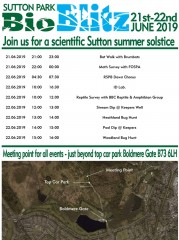
Newt Tadpole ID
Mon 19th August, 2019
Newt Tadpole Identification
When: Saturday 10th August
Where: Fens Pool SSSI - Wardens Base, Pensnett Road, DY5 4NE (by Junction with Bryce Road traffic lights)
What time: 10.30am - 12.30pm
What: Newt tadpole identification - please wear sturdy boots or wellies and weather appropriate clothing.
Please email us at bbcarg@gmail.com to book your space!
Reptile Walk
Sat 21st September, 2019
Join us for a guided reptile walk at Sutton Park led by two of our committee members!
When: Saturday 21st September
Where: Visitors Centre, Sutton Park
Time: 10am - 12pm
Details: Reptile survey with limited spaces. Please contact chameljones@yahoo.co.uk if you would like to book a space.
Committee Meeting
Fri 8th November, 2019
We have a committee meeting coming up soon!
All members are welcome, but it is a committee meeting in which we will be discussing and planning winter events so it's not the most exciting! We will send out meeting minutes and information about events after the meeting has taken place.
Details are as follows:
When? Friday 8th November from 18:30-20:30.
Where? Canal and River Trust Office, 22 Cambrian House, King Edwards Road, Birmingham, B1 2AN.
2020 AGM
Thu 5th March, 2020
We are holding our AGM in March. There are no arranged speakers as we have the West Midlands Conference coming up soon, but we will be electing members into positions and discussing the successes of 2019 and planning the upcoming year.
When? Thursday 5th March, 6.30pm
Where? Aqua House, 20 Lionel St, Birmingham B3 1AQ - google maps here.
West Midlands Regional ARG Conference - POSTPONED
Sat 4th April, 2020
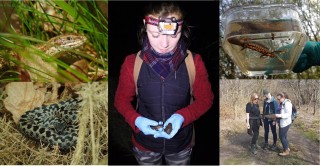
Due to COVID-19 this conference has been postponed. We are looking to reschedule it in the Autumn. Refunds will be issued to anyone who had paid for a ticket and details will be provided when a new date has been arranged.
The Birmingham and Black Country Amphibian and Reptile Group (BBCARG) are pleased to announce that we are organising the West Midlands Regional ARG Conference in conjunction with Amphibian and Reptile Groups UK (ARG UK), at Himley Hall, near Dudley, West Midlands on 4th April 2020.
The theme of the conference will be: ‘Managing reptile and amphibian conservation in a time of increasing public pressure on wildlife’. As we are all too aware in the Midlands, many local populations of our beloved amphibians and reptiles are in a precarious state, and in a time of increasing pressure on our native species and the habitats they depend on, they need all the help they can get. Public pressure can encompass any of the following: disturbance from recreational site users; housing or infrastructure development of important sites or green corridors reducing and fragmenting suitable habitat; the issue of biosecurity; and even the impact of herpetologists, photographers and the wider public, wanting to encounter our native reptiles and amphibians.
Greater public engagement in reptiles and amphibians is a welcome step to encouraging greater interest in the natural world and support for the conservation of what are sometimes classed as ‘less cuddly’ species , but it needs careful management to ensure that the balance between species conservation and public interest is maintained. This paradox is what we aim to explore with this conference - by looking at the different methods that our ARGs, land managers and other conservation professionals adopt to ensure the animals are protected and have the opportunity to thrive, whilst also educating and inspiring people to join us in doing so. We will aim to share our ideas and experiences to improve the work that we all do in the region, and find answers to some of these problematic questions.
The full speaker programme is now available on our website, and we are delighted to welcome Ewan Chapman of the National Trust at Kinver Edge, who will give a keynote presentation on the challenges and solutions of managing a reserve on the urban fringe. We will also be joined by Paul Edgar, Herpetofauna Species Specialist at Natural England, Natalie Norton, Senior Conservation Officer at BBCWT, ARG UK Coordinator, Angela Julian who will discuss some of the outcomes of the ARG UK Adders are Amazing! project, Jennifer Gilbert, Back from the Brink, Cotswolds Community Engagement Officer who will be telling us more about the challenges of managing multi-species conservation and public engagement at a landscape level, Paul Wilkinson from BBC ARG, Ian Tanner from WART, Andrew Nixon, Senior Conservation Manager at the Herefordshire Wildlife Trust who will be telling us about an exciting new Ice Age Pond project they are setting up with HART, and Nigel Hand plus David Dewsbury of GlosARG who will be telling us more about conserving amphibians and reptiles in the Forest of Dean. There will also be an afternoon workshop exploring the issues surrounding balancing balancing public access with conservation priorities. Ticket price will include entry to the conference and welcome refreshments, two tea/coffee breaks, and a buffet lunch. We can cater to any dietary preference.
Please note the deadline for ticket purchases will be Monday 23rd March 2020.
Programme available here.
Tickets available here.
BBCARG GCN Licence Training
Fri 22nd January, 2021
What: BBCARG GCN Licence Training
When: Fri, 22 January. 7pm – 8pm
Where: Zoom (Online)
Join us for a short training session teaching you about Great Crested Newts and the basic species information you will need to know to gain experience for a licence to survey them.
Please join as a member via our Membership page to access this event.
BBCARG Reptile ID & Survey Training
Sun 30th May, 2021
We are teaming up with Froglife's Discovering Reptiles Project Officer, Ben Harris, to bring you a reptile identification and survey methods training event.
This free training will take approximately 3.5 hours and will cover:
- UK reptile identification
- Common/widespread reptile ecology and UK distribution
- Reptile survey methods
This training is perfect for anyone looking to get involved in reptile surveys with the BBCARG, and we would encourage anyone who is interested to attend this training. We are hoping to run some follow-up practical reptile survey training sessions later in the year.
What: Reptile ID and Survey Training Workshop
When: 10:00am, Sunday 30th May 2021
Where: Zoom (online)
Price: Free
To join this training please join the BBCARG via the membership page, once your BBCARGWEB account is set up you will be able to log in and see the event details in the 'Events' tab.
If you have any questions please email us at bbcarg@gmail.com, and we hope to see you there.
Membership and Login
Membership and Login
If you would like to get involved with the group and its activities, you will need to become a member. Membership costs just £4 a year, and as a member you will:
-
Get updates on our work via social media and email
-
Receive our newsletter
-
Be invited to our courses, surveys and other events, which you can access for free
-
Have access to our ARGWEB platform
-
Help us conserve and monitor our local reptiles and amphibians
-
Learn about our local reptile and amphibian species
-
Be entitled to reduced registration fees at ARG UK and ARC Trust events
You can become a member by clicking the PayPal 'Subscribe' button below, which will set up an automatically renewing £4/year subscription to the BBCARG. You can cancel this subscription at any time via your PayPal account, or by emailing us.
If you do not have a PayPal account, you can download our membership form (here:  BBCARG_Volunteer_Membership_form_2019.docx). Once complete please set up a bank transfer using the details provided and email the form to us at bbcarg@gmail.com.
BBCARG_Volunteer_Membership_form_2019.docx). Once complete please set up a bank transfer using the details provided and email the form to us at bbcarg@gmail.com.
Past Newsletters:
December 2020 Newsletter
February 2019 Newsletter
Member Login
Welcome to our ARGWEB members portal! Here you will be able to log in to the BBCARGWEB system and manage your membership preferences.
Wildlife Advice
Wildlife Advice
Unsure what species of amphibian or reptile you have seen?
Have a look at these handy guides to help you identify the animal you have seen - you can also get in touch with any queries.
Reptile ID Guide
Amphibian ID Guide
More information on reptiles and amphibians
Frogs, toads and spawn
Newts
Lizards
Snakes
Non-native species
Reptile and amphibian habitats
Found a sick, injured or dead reptile or amphibian?
Have a look at these handy guides to help you identify what you have seen - you can also get in touch with any queries. Any and all animals should be reported to Garden Wildlife Health.
Amphibian disease (Chytrid and Ranavirus)
Reptile disease (Snake Fungal Disease)
Amphibian disease precautions
You can also find advice on the following topics:
Gardens and ponds
Snakes in gardens
Photo gallery
Photo Gallery
Contact us
Contact Us
For further information on the work of BBCARG contact us by email or find us on one of our social media platforms.
We would like to encourage everyone who has an interest in reptiles and amphibians to join our group as a member.
We also have a YouTube channel we now post educational videos to, click here to visit.
Upcoming Events
Upcoming events will be listed here.
Latest News
- 2024/25 Committee
23/03/2024 4:25 pm - 2023/24 Committee
22/03/2023 8:35 pm - Welcoming Our New Committee
02/04/2021 11:52 am - Newsletter
22/11/2020 5:22 pm - Frog or Toad?
24/02/2020 10:20 pm
© Birmingham and Black Country Amphibian and Reptile Group (BBCARG)
Website hits: 26535
View All | Find out how to get a mini-website for your ARG
© ARG UK Local Groups mini-websites 2025
Wind powered websites by Aye-aye Design.
